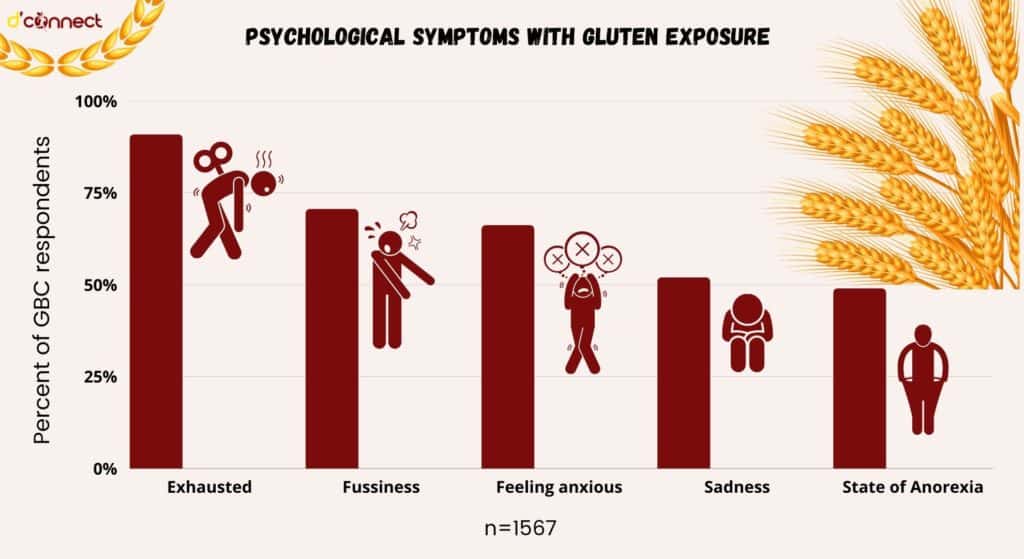
Anishka Ram
(NZRD, MSc. Nutrition and Dietetics)
Note — The article was checked and updated August 2023.
There are several reasons why you might feel uncomfortable and unwell even if you made positive changes and improvements to your diet.
Removing gluten from your diet will be beneficial even if you are not Coeliac or have gluten sensitivity. There are other factors such as food allergies and food intolerances that could be responsible for you feeling unwell, affecting your mood and bowel movements (diarrhea or constipation).
In this article, we will look more closely at food allergies and food intolerances.
Start by removing gluten from your diet
You have removed gluten and all gluten containing products from your diet, and immediately you have noticed a difference in your energy levels. You feel better and less bloated!
You can now definitely see why friends and family can’t stop talking about going gluten free. They all seem to have had great effects by removing gluten from their diet.

But now it’s been a few weeks, maybe months, since you have made that massive change in not only your diet but also your lifestyle; from skimming through ingredients lists on packages to making sure you only choose GF labelled options at your favourite café.
Your energy levels are back to the way it was before, and you may find that some of the benefits were short-lived. Even the bloating is back! Well, if it isn’t gluten, you might be wondering what in your food is making you feel this way.
If you need assistance regarding which gluten-free products to buy during your next shopping trip, I would suggest reading Gluten-Free products: Are they really a healthy alternative for Coeliac Disease?
What are Food Intolerances
An intolerance is an adverse effect that an individual experiences after eating food.[1] Food intolerance to food and additives was discussed in more detail in the Journal of paediatrics and child health.
Common Symptoms of Food Intolerance
Although there are symptoms specific to a particular food source, there are a few symptoms that are commonly related to more than one food intolerance, including
- Bloating
- Abdominal pain
- Fatigue
- Diarrhoea
RELATED — Coeliac Disease: Symptoms and Effects on our health and body
Do food intolerance symptoms last a long time?
It would make sense if the symptoms appeared immediately after consuming a meal. That way we could identify the food or ingredient that is causing these side effects and remove it from our diet straight away.
Unfortunately, for some people symptoms may be delayed for up to 48 hours, some symptoms lasting only a few minutes to a few hours at a time.
What is FODMAP
FODMAP is a group of short chain carbohydrates that stands for Fermentable Oligo-, Di-, Monosaccharides and Polyols.[2]
A Low FODMAP diet is typically followed by those who have been diagnosed with Irritable Bowel Syndrome (IBS). This diet is quite restrictive compared to others as there are many foods that contain FODMAP and need to be avoided.
With this in mind, how do we know that the pancakes we had yesterday weren’t responsible for the stomach pain we have today, instead of the milkshake we just had before our workout today?
Lactose Intolerance
Lactose is a sugar predominantly found in milk and milk products. An intolerance occurs when we don’t have enough enzymes (lactase) to break down the lactose to make it easier to digest, which can lead to malnutrition and malabsorption.[3]
Food and Symptoms Diary
In order to understand which foods are responsible for the side effects you are experiencing, have a go at writing down what you have eaten, how that meal was prepared and how you feel after you have eaten.[4]
Due to some symptoms being delayed for hours, aim to record over the next 2 weeks to find patterns.
Relations between food intake and gastrointestinal symptoms are advised to be monitored and preferably noted down. A diary will be helpful here and it will also help your health professional to navigate through potential foods and their corresponding symptoms and create a treatment plan.[4]
With Masters in Nutrition and Dietetics, Bachelor’s degree in Sport and Recreation and NZIHF (New Zealand Institute of Health and Fitness) Certificate in Personal Training, Anishka’s also interested in weight loss and muscle gain, with a particular focus on encouraging positive behaviors and decisions.
References
(1) Turner, P. J., & Kemp, A. S. (2012). Intolerance to food additives–does it exist? Journal of paediatrics and child health, 48(2), E10-E14.
(2) Varjú, P., Farkas, N., Hegyi, P., Garami, A., Szabó, I., Illés, A., … & Czimmer, J. (2017). Low fermentable oligosaccharides, disaccharides, monosaccharides and polyols (FODMAP) diet improves symptoms in adults suffering from irritable bowel syndrome (IBS) compared to standard IBS diet: A meta-analysis of clinical studies. PLoS One, 12(8), e0182942.
(3) Misselwitz, B., Pohl, D., Frühauf, H., Fried, M., Vavricka, S. R., & Fox, M. (2013). Lactose malabsorption and intolerance: pathogenesis, diagnosis and treatment. United European gastroenterology journal, 1(3), 151-159.
(4) Clevers, E., Törnblom, H., Simrén, M., Tack, J., & Van Oudenhove, L. (2019). Relations between food intake, psychological distress, and gastrointestinal symptoms: A diary study. United European gastroenterology journal, 7(7), 965-973.






